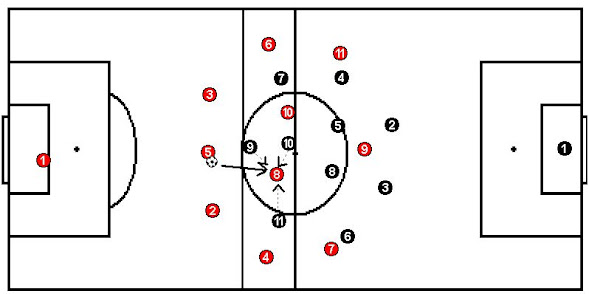El ex del
Sassuolo es uno de los adalides del 'calcio' propositivo que ha culminado con
Italia campeona de Europa. Hoy se estrenará en Champions
Autor: ALBERTO
RUBIO
Fuente:
https://www.marca.com/futbol/futbol-internacional/2021/08/03/610863f922601d4d718b459d.html
Roberto de
Zerbi (Brescia, 1979) 'regatea' los elogios. Jugó en Milan y Nápoles antes de
dar el salto a los banquillos. El ex del Sassuolo lidera la nueva hornada de
técnicos italianos que han desterrado el catenaccio para apostar por un buen
fútbol que ahora quiere exportar al Shakhtar.
Cuenta con
un gran cartel y seguramente no le faltaban ofertas. ¿Por qué el Shakhtar
Donetsk?
Elegí el
Shakhtar porque tiene un modo de ver el fútbol parecido al mío: el director
deportivo, los 'scouts', el director general y, sobre todo, el presidente. Y,
además, porque desde mi punto de vista se trata de un club 'top' en Europa.
Según
'Transfermarkt' son el octavo equipo que más ha gastado (47) este verano. ¿Qué
objetivos se marca?
El primer
objetivo del Shakhtar es ganar la Liga y, después, hacerlo bien en Europa.
Hemos fichado a Pedrinho, Marlon y Lassina Traoré y Vinícius Tobías llegará en
enero. Iniciamos un nuevo ciclo y son tres jugadores específicos y funcionales
para hacer el tipo de fútbol que queremos. Confío en que serán patrimonio del
club para los próximos años.
Elegí el
Shakhtar porque tiene un modo de ver el fútbol parecido al mío y porque, a mi
juicio, es un club 'top' en Europa
Hoy
debutará como técnico en Champions. Será en la tercera ronda previa contra el
Genk. ¿Cómo ve la eliminatoria?
Los equipos
belgas son siempre muy organizados. Cuentan con jugadores jóvenes, pero
fuertes. Será difícil pasar de ronda para el Shakhtar... pero también para el
Genk.
¿Hasta dónde podría llegar el Shakhtar en caso de llegar a la fase de
grupos?
El
Shakhtar, juegue contra quien juegue, sale pensando en ganar. Los límites los
marcará el terreno de juego, pero no es bueno poner límites de salida. Ahora
jugamos contra el Genk y queremos pasar, pero, si pasamos, tendremos otros dos
partidos antes de la fase de grupos. Si los superamos, el objetivo será el
mismo: avanzar a octavos. Y luego... partido a partido. Insisto, salimos al
campo pensando en vencer a cualquiera.
El
Shakhtar, juegue contra quien juegue, sale pensando en ganar. Los límites los
marcará el terreno de juego, pero no es bueno poner límites de salida
Entrena a
un equipo que tiene 13 brasileños en sus filas. ¿Le ha sorprendido?
Todos los
jugadores brasileños son chicos serios, muy profesionales. Tienen grandísimas
cualidades tanto físicas como técnicas. Es un placer entrenarles y tenerlos en
la plantilla. Para mí, todos los jugadores son iguales: brasileños, ucranianos,
africanos... Trato a todos de igual modo.
El Shakhtar
ya ha marcado varios goles 'made in De Zerbi' en pretemporada, saliendo jugando
desde atrás. ¿Cuál es el secreto?
El secreto
no es De Zerbi, es contar con jugadores de calidad. Trabajamos mucho en los
entrenamientos. Lo bueno del Shakhtar es que los jugadores han entendido rápido
cuál es mi idea.
¿Mi estilo? El secreto no es De Zerbi, es contar con jugadores de calidad
Ha
propiciado el cambio de estilo del 'calcio' con su fútbol y el Sassuolo aportó
tres jugadores (Locatelli, Berardi y Raspadori) a la Italia campeona de Europa.
¿Se siente partícipe de ese éxito?
No me
siento responsable. Me siento responsable de lo que he hecho en el Sassuolo.
Tratamos de darle al club una filosofía de juego diferente, que es la que me
identifica y representa. Italia ha tenido la suerte de contar con Mancini, que
ha traído su filosofía y ha llevado a Italia a ganar un trofeo a través de otro
modo de juego, que no era la de contragolpe. Esto ha sido lo bonito de esta
victoria. Mancini ha cambiado la historia futbolísitica de Italia.
No me
siento responsable por la Eurocopa 2020, Mancini ha cambiado la historia
futbolística de Italia
Estuvo
cerca de entrenar a Las Palmas, ¿no es así?
Hace 4-5
años debía ir a Las Palmas, que estaba en Primera, pero no se dio. LaLiga es un
campeonato que me gusta y me estimula. En cualquier caso, acabo de llegar al
Shakhtar y creo y espero estar aquí varios años.
Hace 4-5
años debía ir a Las Palmas, pero no se dio. LaLiga es un campeonato que me
gusta y me estimula
¿Cómo le gustaría que la gente recordara a 'su' Shakhtar?
Me gustaría
que dijeran que tenemos buenos jugadores, que contamos con un estilo de juego
bien definido, que es un buen club y que es un equipo que se la juega contra
cualquiera: desde el colista de la Liga ucraniana al Real Madrid, City,
Bayern... Queremos jugar contra todos con el mismo estilo y el mismo coraje de
ir a por los partidos y ganar.
¿Se conformaría con ganar la Liga ucraniana?
Vencer es
un objetivo, pero sabemos que será difícil. El otro objetivo que tengo en la
cabeza es que cuando me marche del Shakhtar quiero haber dejado un estilo en la
forma de jugar y en la mentalidad. Igual que hice previamente en Sassuolo,
Benevento...
Amenazó con
no jugar contra el Milan porque entendía que la Superliga era un "golpe de
Estado" contra el fútbol. Su reflexión llegó a España y caló hondo.
Pienso lo
mismo que dije antes de la partida contra el Milan y lo confirmo al 100%. Claro
que habrá clubes que jamás podrán vencer porque el valor de los jugadores no es
el mismo. Pero, de partida, todos deben tener el derecho de participar. No me
gustaba la idea de tener una Superliga donde había equipos que participaban por
decreto y otros que no participarían nunca. Igual que los 16 equipos de Ucrania
parten pudiendo ganar el campeonato o el Shakhtar, en caso de clasificarse para
la Champions, debe tener el sueño de poder vencerla.


















